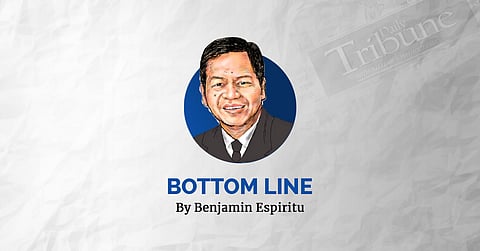
- NEWS
- the EDIT
- COMMENTARY
- BUSINESS
- LIFE
- SHOW
- ACTION
- GLOBAL GOALS
- SNAPS
- DYARYO TIRADA
- MORE

Last 5 January, the Philippine Statistics Authority reported that the inflation rate for December 2023 went down to 3.9 percent, the lowest rate for the year. This is an improvement over the November inflation rate of 4.1 percent and December 2022’s 8.1 percent. However, the annual average inflation rate for 2023 is 6 percent, higher than the 5.8 percent average in 2022. This is also much higher than the government’s 2-4 percent inflation target.
As of this date, the Philippine economy is considered one of the fastest growing in the region. The Secretary of Finance recently reported that several multilateral organizations such as the Asian Development Bank, International Monetary Fund, and ASEAN+3 Macroeconomic Research Office, among others, rated the Philippines as having the best GDP growth outlook for 2024 among selected ASEAN nations such as Singapore, Malaysia, Thailand, Indonesia and Vietnam.
Credit rating agencies S&P Global Ratings, Fitch Ratings and Moody’s Investors Service also have a positive economic outlook.
The country’s macroeconomic statistics are generally good. However, there seems to be a very wide gap between the macroeconomic figures and what most people believe the real state of the economy is.
The Pulse Asia survey conducted last December, the results of which were released earlier this week, showed that 72 percent of the respondents considered inflation the primary and most urgent problem of the country.
Controlling inflation was the number one concern in all geographic areas — the National Capital Region, Balance Luzon, Visayas, and Mindanao — and all socio-economic classes — ABC, D and E.
The other primary national concerns were increasing the pay of workers (40 percent), creating more jobs (28 percent), and reducing the poverty of many Filipinos (25 percent). Fighting graft and corruption in government was the fifth top national concern (19 percent).
The disparity between the macroeconomic statistics and the people’s primary concerns, as shown by the Pulse Asia survey, clearly indicates the absence of real inclusive growth.
There is no question about the capabilities of the government’s economic team to improve the country’s economy. The solutions to controlling inflation and solving the most pressing economic concerns of the people are in all the economic textbooks. However, implementing them fully is another thing altogether.
Firstly, there are several factors in implementing economic policies, the most important of which is the political factor. It is the elected politicians who formulate policies and appoint the people who will implement them.
Secondly, there are geopolitical and economic factors outside the control of the economic managers.
If the political actors do not formulate the correct economic policies and ensure proper implementation, everything will fail. If, despite all of the positive economic measures, there is rampant graft and corruption, then solving the four major concerns — controlling inflation, increasing workers’ pay, creating more jobs, and reducing poverty — becomes impossible.
Interestingly, the survey responses ranked fighting graft and corruption only as the fifth major national concern, with a low percentage (19 percent). Fighting graft and corruption should actually be one of the primary solutions to the first four major concerns.
There are geopolitical factors that also have to be considered. There is much turmoil in the world now — the Russian invasion of Ukraine and the Israel-Hamas war being among the major ones. Several significant elections are scheduled worldwide this year, the outcome of which will have global effects. The results of the US presidential elections is probably the most critical.
At the end of the day, the prospects for the Philippine economy are dependent on what our political leadership will do to have the required economic policies in place and on what actions they will take to ensure their proper implementation.
Good public governance is the key to a good economy and inclusive growth.
